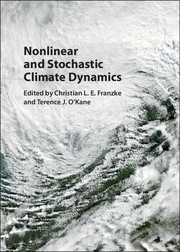Book contents
- Frontmatter
- Contents
- List of Figures
- List of Contributors
- Preface
- 1 Challenges for Ice Age Dynamics: A Dynamical Systems Perspective
- 2 Tipping Points in the Climate System
- 3 Atmospheric Teleconnection Patterns
- 4 Atmospheric Regimes: The Link between Weather and the Large-Scale Circulation
- 5 Low-Frequency Regime Transitions and Predictability of Regimes in a Barotropic Model
- 6 Complex Network Techniques for Climatological Data Analysis
- 7 On Inference and Validation of Causality Relations in Climate Teleconnections
- 8 Stochastic Climate Theory
- 9 Stochastic Subgrid Modelling for Geophysical and Three-Dimensional Turbulence
- 10 Model Error in Data Assimilation
- 11 Long-Term Memory in Climate: Detection, Extreme Events, and Significance of Trends
- 12 Fractional Stochastic Models for Heavy Tailed, and Long-Range Dependent, Fluctuations in Physical Systems
- 13 Modelling Spatial Extremes Using Max-Stable Processes
- 14 Extreme Value Analysis in Dynamical Systems: Two Case Studies
- Index
Preface
Published online by Cambridge University Press: 26 January 2017
- Frontmatter
- Contents
- List of Figures
- List of Contributors
- Preface
- 1 Challenges for Ice Age Dynamics: A Dynamical Systems Perspective
- 2 Tipping Points in the Climate System
- 3 Atmospheric Teleconnection Patterns
- 4 Atmospheric Regimes: The Link between Weather and the Large-Scale Circulation
- 5 Low-Frequency Regime Transitions and Predictability of Regimes in a Barotropic Model
- 6 Complex Network Techniques for Climatological Data Analysis
- 7 On Inference and Validation of Causality Relations in Climate Teleconnections
- 8 Stochastic Climate Theory
- 9 Stochastic Subgrid Modelling for Geophysical and Three-Dimensional Turbulence
- 10 Model Error in Data Assimilation
- 11 Long-Term Memory in Climate: Detection, Extreme Events, and Significance of Trends
- 12 Fractional Stochastic Models for Heavy Tailed, and Long-Range Dependent, Fluctuations in Physical Systems
- 13 Modelling Spatial Extremes Using Max-Stable Processes
- 14 Extreme Value Analysis in Dynamical Systems: Two Case Studies
- Index
Summary
Unquestionably the climate system is a highly nonlinear and complex system characterized by the communication of coherent information across a multitude of scales and exhibiting on occasion abrupt transitions between periods of relative stability. Given the importance of the potential societal impacts of anthropogenic influences, knowledge of both the past and future evolution of the climate system is of utmost importance. As a consequence there has been increased demand for predictions on the timescales from seasons to decades. To underpin predictive models beyond the timescales of synoptic weather forecasts, there is a huge need for applied mathematical, statistical, network, and complexity approaches to further our understanding of where predictive skill resides in the climate system.
The nonlinear, stochastic, and multiscale nature of the problem makes development of a foundational theoretical basis for climate variability and predictability a distinct challenge. Mathematicians, geoscientists, and fluid dynamicists are by nature attracted to the “hard problems” and this is reflected in the growing richness of approaches and increasing numbers of interdisciplinary mathematical and geoscience researchers attending the Nonlinear Processes sessions of the two big geosciences unions, the European Geoscience Union and the American Geophysical Union and dedicated conferences like SIAMs Mathematics of Planet Earth.
Traditional climate science has understood many important aspects of the climate system by linearizing the equations of motions and by making Markovian and Gaussian assumptions in combination with a deterministic view of the climate system. However, there is increasing observational evidence that the climate system is highly nonlinear, nonstationary, and non-Gaussian and that in many areas memory (non-Markovian) effects are important. These effects render our ability to make skillful predictions based on linear methods highly problematic. It has been shown that stochastic parameterizations can significantly improve ensemble prediction and data assimilation schemes. More generally, stochastic methods are particularly well suited for the analysis of high dimensional, nonstationary multiscale systems of which the atmosphere and ocean are two paradigmatic examples. Furthermore, stochastic methods have been shown to become crucial to understanding the impact of small-scale growing disturbances on the large-scale quasi-stationary structures manifest in the climate.
- Type
- Chapter
- Information
- Nonlinear and Stochastic Climate Dynamics , pp. xxxi - xxxivPublisher: Cambridge University PressPrint publication year: 2017



